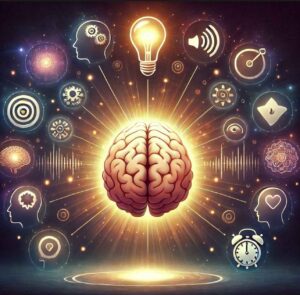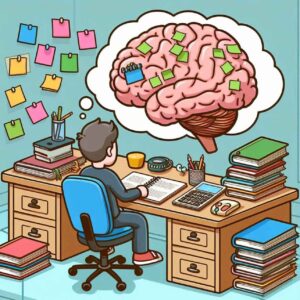Welcome Blessings!
(Tap 🔽 to see more topics!)


Have you ever noticed how your brain seems to operate on autopilot without you even asking it to? One moment, you’re making a simple decision about what snack to choose, and the next, a random childhood jingle is playing in your head. It’s as if you have an overenthusiastic personal assistant who’s always one step ahead of you but never needs a break.
While these moments might feel like little glitches in the matrix, they’re fantastic proof of how effortlessly our minds handle things without even realizing it. So, let’s kick back and take a fun look at the secret tricks our brains pull off every day, from tiny tasks to mind-blowing mental feats!
Imagine you’re sitting in a loud café, deep in conversation when suddenly, you hear your name from across the room. Instantly, your head turns whenever you hear that sound. But why? It’s not as if you’re consciously listening for it, yet your brain reacts like it’s the most essential thing in the world.
That’s because it acts like a VIP bouncer at a club. It has an in-built filter that sifts through all the noise but is always on high alert for anything personally relevant. Our name, for example, is flagged as “important,” almost like a Google alert we never signed up for. This ability helps keep us aware of things that might matter in our environment, ensuring we don’t miss crucial social cues.

How often have you found yourself staring at a menu for too long, unable to decide? Everything looks good, yet nothing stands out as “the one.” It is a classic case of decision paralysis. Your brain, eager to make the best choice, gets caught up in overthinking. It’s like when you’re scrolling through Netflix for 30 minutes without committing to a movie—too many options make it harder to choose.
The paradox of too many choices is fundamental, highlighting how our brains sometimes struggle with abundance. The more options we have, the more overwhelmed we feel, even when picking a snack or planning a weekend activity.
Have you ever mimicked how your best friend laughed or even picked up their little phrases? Your cognitive ability mirrors others without you even realizing it. It’s a subtle survival mechanism, allowing us to bond with others and fit in.
Much like how animals camouflage themselves to blend into their surroundings, the mental process automatically adjusts to help us align with the social dynamics around us. Whether we’re mirroring body language or speech patterns, this effect helps create smoother and more genuine connections.
Why staring at the ocean or a clear blue sky makes you feel instantly relaxed? The answer lies in the calming power of blue. Our mind associates the color blue with stability, serenity, and peace. It’s like it is in “the chill mode” button. It’s no surprise that meditation apps and sleep aids often incorporate soft blue tones. They know our mind responds to them as a natural signal to unwind. This simple color can profoundly impact how our brain processes and reacts to its environment.
Anyone who’s ever crammed for an exam the night before knows that it rarely leads to long-term retention. That’s because our brain prefers learning in bite-sized chunks. Imagine trying to water a plant by pouring an entire gallon of water at once. Well, it won’t absorb it all, and probably the plants won’t ever thank you.
Similarly, the cognitive process functions best when we absorb new information gradually. Cramming may feel efficient at the moment, but in the long run, spaced-out learning is what helps information stick. This technique, known as spaced repetition, is one of the best ways to boost retention and reinforce knowledge over time.

Ever refresh your weather app multiple times, hoping the forecast will magically change from rain to sunshine? It’s an odd yet common reflex, and it’s fueled by our brain’s optimism bias. It has a natural tendency to lean toward positive outcomes, sometimes ignoring the more realistic scenarios. This bias helps keep us hopeful, even when circumstances aren’t extraordinary. It’s similar to that one friend who always thinks they’re about to win the lottery- it clings to hope, even when logic suggests otherwise.
For example, if you trip on the sidewalk, you immediately feel like the world has seen your clumsy moment. Most people probably didn’t notice. However, most people are too busy starring in their own lives to notice your slip-up. This “spotlight effect” amplifies your self-consciousness, making you feel like the world is paying far more attention to you than it is.
That first sip of coffee from a new café, when it’s just perfect, lingers in your memory as the ultimate gold standard. No other cup of coffee seems to measure up, no matter how good the other is. Your mind locks in that first impression, and every subsequent experience gets compared to it. This happens not just with food or drinks but also with people, places, and brands. The initial experience sets the tone for all others, and the brain often defaults to comparing everything else to that first encounter.
When we meet someone who volunteers at an animal shelter, our brain immediately starts filling in the blanks. That person seems like a kind, generous soul, and we assume they must also be excellent in other areas of life. It is known as the halo effect, where our brain automatically applies positive attributes from one domain (like rescuing animals) to others (like being a great friend or partner). Our brain slaps a “good vibes only” sticker on them, even if we know little about their other qualities.
You’ve seen it in movies and perhaps even experienced it in real life. When someone drops their groceries, you hesitate momentarily, waiting for someone else to jump in and help. It is called the bystander effect in action. The brain assumes that others will take the lead, leading to inaction. The more people present, the less likely anyone is to step in because your brain is waiting for someone else to do it. This tendency can delay help in emergencies, as everyone feels someone else will act.

A hug, a fist bump, or even a pat on the back can instantly boost our mood. Physical touch releases oxytocin, often called the “cuddle hormone” or “love hormone.” Oxytocin fosters feelings of connection, trust, and comfort. When we make physical contact with others, our brain receives a positive signal, almost like an emotional battery recharge. It’s a simple yet powerful way our brain helps us manage stress and build stronger bonds.
Laughter is contagious, and our brain is hardwired to respond to it. Have you ever noticed that a joke is funnier when you’re sharing it with friends or with your loved ones than when you’re watching it alone? That’s because laughter serves as a social connector.
Our mind sees it as a way to bond with others, reinforcing relationships and shared experiences. In a sense, laughter is our brain’s way of strengthening social ties and creating a sense of community, whether in a casual conversation or during a fun night out.
Remember when you walked into a room and forgot why you went in? It’s frustrating but also fascinating how your brain stores and retrieves memories. It uses spatial memory, like a personal GPS, to help you remember information tied to specific locations. When we retrace our steps, our brain uses spatial clues to jog our memory, almost like putting together a puzzle. This ability allows our brain to map out its surroundings and associate important events with particular places.
The sense of smell uniquely connects to memory. When you catch a whiff of a familiar perfume or holiday dish, memories from the past flood in because your brain links scent to emotions more strongly than any other sense. When we smell something familiar, our brain activates old memories, pulling us back in time. This powerful link between scent and nostalgia acts as an internal time machine, letting us relive moments from our past with just a single smell.
Do you find yourself automatically reaching for your phone first thing in the morning or heading to the gym without thinking about it? These are habits that your brain has locked in, running on autopilot like a well-rehearsed orchestra. Once we establish a habit, the brain no longer needs to think about it consciously; it becomes ingrained in our routine. This automatic behavior allows us to conserve mental energy for other, more complex tasks while keeping up with daily routines.
You’ve probably experienced this at least once: someone yawns, and before you know it, you’re yawning, too. It’s not just about being tired… it’s your brain’s way of syncing with others. This contagious reflex helps strengthen social bonds and promote empathy. When you yawn with someone, you’re subconsciously saying, “I get you.” It helps create a feeling of connection and shared experience.
Even when someone is wearing a mask or sunglasses, you can usually still recognize them. It is because your brain is exceptional at reading faces, even when part of the picture is missing. Our brain is like a detective, piecing together clues from eyes, expressions, and posture to complete the puzzle. This ability to recognize faces quickly and efficiently helps us in the social world, ensuring we don’t miss essential cues or connections.
Why are phone numbers broken into small groups instead of long digits? It’s not just to make it easier for us; it’s a trick our brain uses to simplify complex information. Chunking, as it’s called, is a way of organizing information into manageable units, like breaking down a big task into smaller, more achievable steps. This technique helps our brain process and retain information more efficiently, reducing mental overload and making it easier to recall later.
Food always tastes better when someone else makes it. It’s not just about the effort- it’s the element of surprise. The mind processes flavors differently when you haven’t been part of the preparation process. It’s subtle, but interesting how it links trying new things and putting in effort to get something good.
When you experience something new or surprising, like a delicious meal someone cooked for you, your brain gives it a higher value, even if the taste is the same as something you could have made yourself.
If you’re trying to build a new habit, here’s a helpful rule: stick with it for about two months. According to research, it takes around 66 days for a behavior to become automatic in your brain.
Whether it’s a new exercise routine, healthier eating habits, or a daily journaling practice, our brain needs time to adjust and make the new behavior stick. At first, it may feel awkward, like learning a new dance move. But with enough repetition, it eventually becomes second nature.
Did you feel guilty over something seemingly insignificant, like forgetting to reply to a text message or not holding the door open for someone? It might be because your brain has an incredibly sensitive social radar, constantly scanning for potential emotional cues from others.
It ensures that relationships are not messed up, even in minor ways. Its heightened sensitivity to social signals helps you maintain harmony in your connections with others, ensuring that your relationships stay strong and intact.
Ever zone out in the middle of a task, only to find that your brain starts generating creative ideas? That’s the brain taking a mental break, allowing space for creativity to flow. Daydreaming is not just a distraction; it’s a key component of the creative process.
When our brains are free to wander, they generate new ideas and solutions. It’s like a writer stepping away from the keyboard to find inspiration elsewhere.
When you look at someone you’re attracted to, your pupils dilate, sometimes up to 45%. This physical response is your brain’s saying, “This person matters.” It puts them in high-definition vision, making them seem even more appealing. This quick, subconscious reaction is part of the brain’s signaling interest and connection, even before you consciously recognize it.
Having your smartphone nearby can lower your focus even if you’re not using it. Your brain keeps a tiny percentage of attention reserved for the phone, waiting for a notification or text message. It’s like your brain is on high alert, anticipating a distraction. This phenomenon, known as “phone-induced distraction,” shows how much technology affects our brains. Even when we’re not actively engaging with our devices, they grab our attention, lowering our ability to focus on the task.

Our brains constantly work behind the scenes, making life easier, more fun, and sometimes hilariously unpredictable. It’s responsible for everything from keeping us safe in a crowded room to generating creative ideas during downtime. Next time you instinctively respond to your name in a crowded space or when a familiar scent takes you back in time, take a moment to appreciate the magic inside your mind. It’s a mysterious and unpredictable process that makes life much more enjoyable.
Want to explore more fascinating insights? Check out our other articles, and subscribe to our newsletter on your request for fresh, exciting updates straight to your inbox. Don’t miss the latest tips and inspiration! Thanks for reading, and see you at the next one!